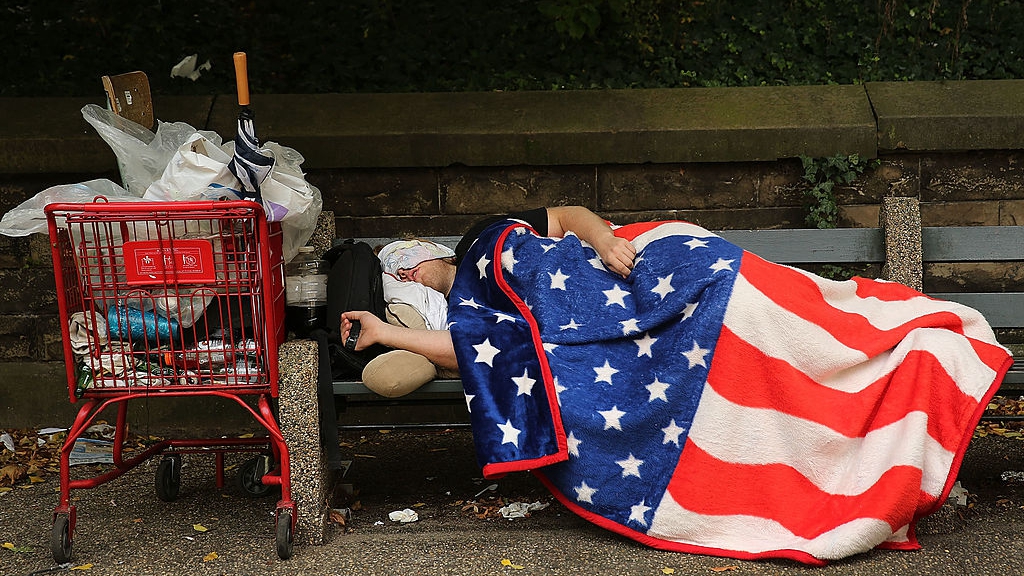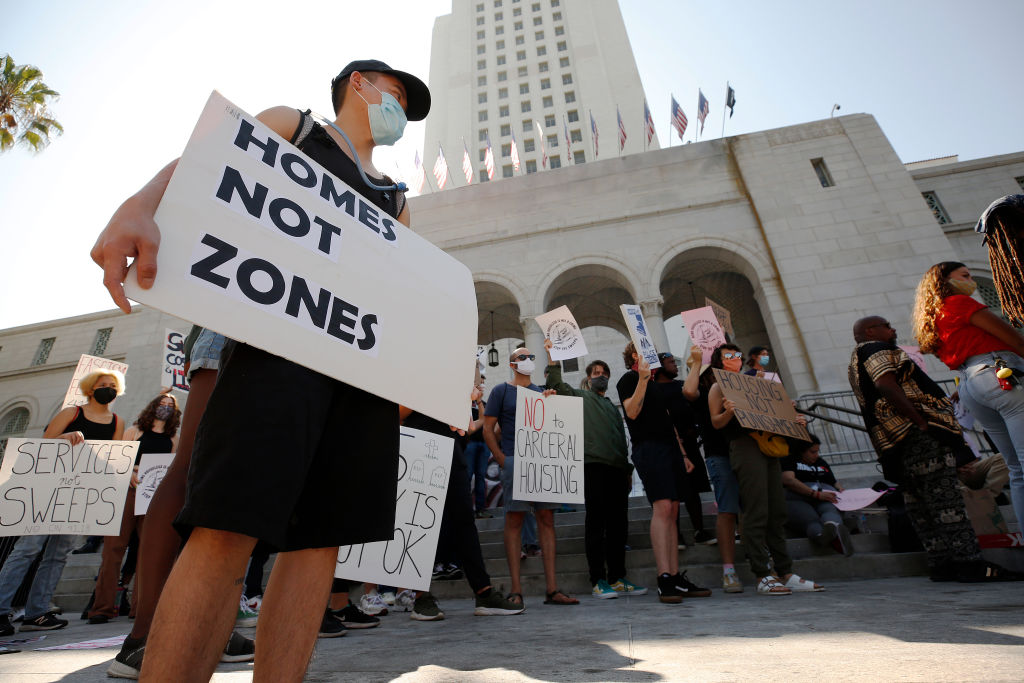
A homeless man sleeps under an American Flag blanket on a park bench in the Brooklyn borough of New York City, New York, U.S. /Getty
A homeless man sleeps under an American Flag blanket on a park bench in the Brooklyn borough of New York City, New York, U.S. /Getty
Editor's note: Andrew Korybko is a Moscow-based American political analyst. The article reflects the author's opinions and not necessarily those of CGTN.
Expiration of the U.S.'s COVID-19 eviction ban on July 31 threatens to compound America's worsening socioeconomic crisis. The pandemic unexpectedly made it even more difficult for many already struggling Americans to make ends meet.
That was one of the reasons why the former Trump administration implemented its plan to send checks to its citizens, increase unemployment benefits and ban evictions. It didn't want more people to become homeless during the pandemic because that could pose a serious epidemiological threat apart from how immoral it would be, not to mention the impact on the U.S.'s soft power.
It's unclear whether there's any realistic way to reimpose the eviction ban or devise some legal workaround for prolonging it in practice. What matters most at this moment is that "more than 15 million people in 6.5 million U.S. households are currently behind on rental payments, according to a study by the Aspen Institute and the COVID-19 Eviction Defense Project, collectively owing more than $20 billion to landlords," as cited by Reuters.
This presents multifaceted challenges for America. It must avoid a sudden surge in homelessness, keep its citizens safe from COVID-19, and also prevent the rental market from collapsing.
The expiration of the COVID-19 eviction ban will likely lead to more homelessness. Not everyone has close family or friends who would be offering to house them and, in some instances, also their families, not to mention for free if they're still unemployed or underemployed and was the reason why they couldn't pay their rent in the first place.
Furthermore, people are rightly concerned about reducing their interpersonal contacts to diminish their chances of catching the virus. Bringing more people into their home would therefore be counterproductive from an epidemiological security perspective.
This brings the discussion to the second identified challenge, which is keeping everyone safe from COVID-19. Those who are evicted from their homes and forced into someone else's or into the streets will have a higher chance of catching the virus.
More infected people means a greater strain on the country's healthcare services, and each death that might come with it is tragic in its own way, to say nothing of theoretically having been avoidable had the deceased not caught COVID-19 due to their worsening circumstances after the eviction ban expired. The U.S. has an epidemiological, economic and moral obligation to prevent this worst-case scenario.

People gathered for "The Right to REST without ARREST" rally and press conference on the steps of Los Angeles City Hall organized by homeless advocates across Los Angeles, California, U.S. /Getty
People gathered for "The Right to REST without ARREST" rally and press conference on the steps of Los Angeles City Hall organized by homeless advocates across Los Angeles, California, U.S. /Getty
The final challenge is to prevent the rental market's collapse. Regardless of how one feels about landlords, these people have bills to pay and families to feed. Some of them have also been struggling after being unable to collect rent from their tenants but still having financial obligations that they hitherto expected to meet prior to COVID-19 causing the current socioeconomic crisis.
Struggling landlords are also prone to raise rent in order to compensate for additional costs, which places an even greater burden among struggling renters, some of whom are then evicted if they can't pay. The cycle then continues and everything becomes worse.
These observations suggest an obvious solution: extending the moratorium on evictions during the pandemic. If that's too legally difficult to do on a federal level, then the states should take the lead like California and New York have done according to Reuters' earlier cited article. For those that don't follow in their footsteps, civil society will have to step up however possible in order to protect their compatriots.
Charities, religious groups and other non-governmental organizations will have to band together to help their desperate neighbors. Under no circumstances must they allow the impending eviction crisis to take shape.
The prevailing uncertainty makes many people uncomfortable, even those not directly affected by the eviction ban's expiration. It also reflects very poorly on America's image across the world. Everyone sees that the U.S. can't properly care for its citizens during the pandemic and is even risking a sudden surge of homelessness due to its government's political dysfunction.
This powerfully exposes the false narrative that was recently pushed by the influential media outlet Bloomberg, which earlier claimed that the U.S. tops the world in terms of its society's resilience to COVID-19. The impending eviction crisis proves that wasn't true at all.
(If you want to contribute and have specific expertise, please contact us at opinions@cgtn.com.)

